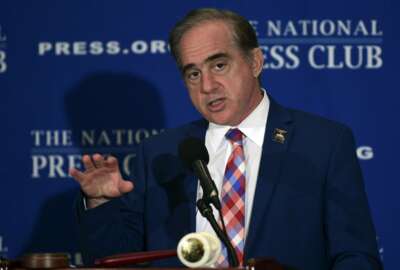
Sen. Tester: ‘Now is the year Shulkin really needs to perform’
Sen. Jon Tester said he'd like to see more proactivity from the VA, especially in recruitment and oversight.
Congress went all out for Veterans Affairs reform in 2017, passing bills to overhaul veterans’ education benefits, improve employee accountability and protections for whistleblowers at the department and modernize the claims appeals process, among others.
The Caring for our Veterans Act is currently working its way through committee in the Senate. Soon, Sen. Jon Tester (D-Mont.) said, it will be time to see just what VA Secretary David Shulkin can do with those tools.
“Now is the year he really needs to perform,” Tester said on Agency in Focus. “I think that we’ll have given him every tool in the book that he needs to be successful, and now I think our major role is to be able to do the oversight and accountability that’s going to be necessary to see that our Veterans get what they’ve earned.”
Currently, Tester told the Federal Drive with Tom Temin that he’d give Shulkin’s performance a B+, but said that’s likely to change in the near future, and whether that grade goes up or down depends on how Shulkin moves forward with VA reforms.
That said, there’s a very specific reason Tester didn’t give Shulkin an A: Tester is concerned about staffing inadequacies at the department.
He said there are a number of high-level positions still open at the VA, and it’s not because the Senate has been holding up any nominations. But beyond that even, the VA simply doesn’t have enough doctors, nurses and other medical staff to care for all the veterans.
“We’ve got a staffing crisis in the VA right now, and we’ve got to get on that,” he said.
He said VA needs to get more aggressive about recruiting, because most doctors aren’t signing up to work in rural, understaffed regions while making less money than in the private sector. He said better pay and student loan forgiveness are two tools the VA could use to improve recruitment efforts.
But beyond that, he said officials should consider other, less tangible enticements to live and work in these areas. He used the example of Glasgow, Montana, a small town of between 3000-4000 residents that hasn’t had a VA doctor in years. He said he went there and spoke to the people who live and own businesses there to find out what entices them to live there. Those reasons might be more successful at drawing other like-minded individuals.
There are other things he’d like to see Shulkin move forward on, but none are as high a priority, he said, as establishing the new electronic health record system. That, he said, would be critical to any other major reforms the department undertakes, like offering veterans more freedom to seek care outside the VA, or foregoing larger VA medical centers for more, smaller community clinics.
“You can outsource a service, but you cannot outsource responsibility,” Tester said. “It is our responsibility, the United States of America’s responsibility, to make sure that these have adequate healthcare. So if they don’t get it in the VA, and they do get it in the private sector, there needs to be electronic medical record transfer that is seamless.”
Tester isn’t a tech person, by his own admission, but he said while VA is in the process of building an electronic health record that is compatible with the Defense Department’s system, it should look into building in compatibility with systems in the private sector as well, to make it as versatile as possible.
That kind of proactivity is what Tester said he’d like to see more of from the VA, especially in recruitment and oversight. It might be enough to earn Shulkin that A.
Copyright © 2025 Federal News Network. All rights reserved. This website is not intended for users located within the European Economic Area.
Daisy Thornton is Federal News Network’s digital managing editor. In addition to her editing responsibilities, she covers federal management, workforce and technology issues. She is also the commentary editor; email her your letters to the editor and pitches for contributed bylines.
Follow @dthorntonWFED





